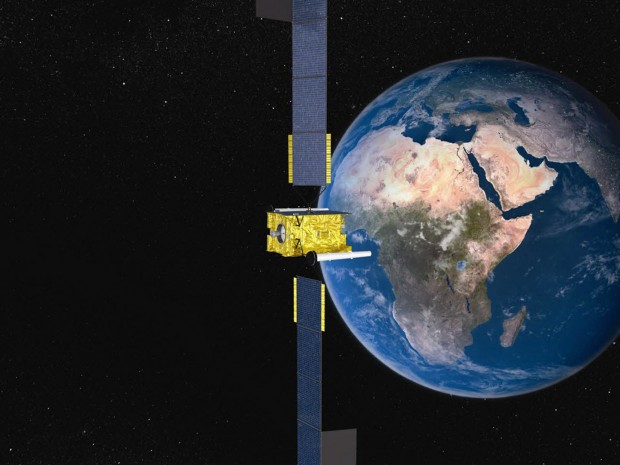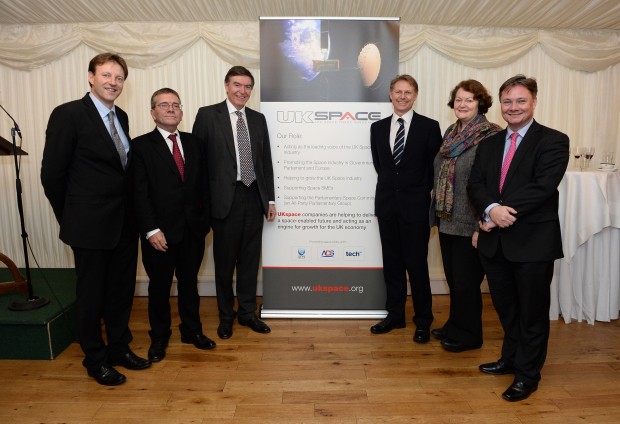
Today British astronaut (and former Army officer, now Reservist) Major Tim Peake blasts off to the International Space Station, opening yet another chapter in the story of Britain’s place among the stars. I join everyone across Britain in wishing him well. The MOD has long been a leading UK player in space, especially satellite communications. For the past decades we’ve done this through the Skynet constellation. We began launching Skynet in 1969, fifteen years before the evil artificial intelligence of the same name featured in The Terminator film in 1984!

Today our everyday lives are increasingly dependent on space. It is the technology behind our mobile phones, Google maps, the internet and satellite navigation. It affects our daily lives in ways that many do not realise – such as accessing cash from your local ATM machine which relies on the Global Positioning System (GPS) to identify when and where the money was withdrawn. Soon satellite communications will provide broadband access to remote locations, and before too long spaceplanes will take affluent space tourists on incredible journeys like the one Tim Peake is making today.
Space is also vital for our economy; it is one of the fastest growing sectors in the UK, expanding an average of 8% over each of last 5 years, so it is now worth over £11Bn a year.The UK space industry is rapidly developing into a major global player, as I learned when I joined the Parliamentary Space Committee reception last week in the House of Commons.

We in Defence fully understand that the military has led the way on space technology. After all, GPS, providing satellite navigation all over the world, is a US military system. More than 90% of the platforms and systems within the UK military equipment programme are dependent on space to some degree. We have become more and more reliant on space capabilities, with their amazing operational advantages, but we haven’t always fully understood the attendant risks.
These risks in space are increasing, and come from both natural and man-made sources. There are real dangers of ‘space debris’ - remains of previous spacecraft orbiting the Earth that travel at speeds of up to 17,500 mph. Environmental hazards, like geomagnetic storms, can damage Earth-orbiting satellites. We also have to be alive to the fact that many of our potential adversaries see our reliance on space as a chink in our armour, so are developing weapons that could disrupt our access to vital satellite capabilities.
Another issue, where I have had passing involvement, is the pioneering work to develop a UK spaceflight capability. The Government’s ambition is to lead space tourism in Europe by operating commercial spaceplanes from a spaceport in the UK, and Defence is supporting this project. Why is MOD involved? We need to make sure spaceplane operations do not impact our ability to conduct air operations and flying training in the UK.
In response to these challenges, we launched the National Space Security Policy in April 2014. This sets out for the first time, in black and white, how we intend to ensure the UK’s access to the space services we need.
The Strategic Defence and Security Review published last month also recognised these growing challenges. As a result, we are enhancing our satellite communication and navigation capabilities as well as improving our space surveillance. It also committed us to publishing a National Space Policy, which we did on 13 December 2015 (last Sunday). This sets out how Britain will seize opportunities to deliver new businesses, create top-quality jobs, and help us gain a better understanding of space. With this policy, we are also establishing a ministerial committee to coordinate action on both prosperity and security.
SDSR also sets out how UK will defend itself from Ballistic Missiles (many of which travel through space) by announcing that we will invest in ground-based Ballistic Missile Defence (BMD) radar to enhance NATO’s, and therefore the UK’s, ability to defend against this growing threat. The SDSR also announced we would explore further the potential of the Royal Navy’s Type 45 Destroyers to operate in a BMD role. This follows on from HMS DAUNTLESS’ participation in the successful At Sea Demonstration in the Hebrides in October to test UK and allies’ capability to provide missile defence. This is a significant step forward in our understanding of the potential for T45 to carry out a tactical ballistic missile defence role.
Many issues around space are, by their very nature, international issues. So working with our allies is absolutely vital. We have been collaborating with the US on space for more than 50 years: the radar at RAF Fylingdales monitors objects in space as part of the US Space Surveillance Network. In recent years we have worked with the US, Canada, Australia and New Zealand as part of the Combined Space Operations initiative, building a joint construct for space operations. We are also working with our partners in the European Space Surveillance and Tracking programme to track space debris.
The space domain presents huge challenges, but also, as today’s launch clearly shows, massive opportunities. It continues to challenge us to look to the future. This helps us remain at the forefront of keeping our country safe, maintaining our Armed Forces’ technical edge and ensuring our growing space industry and academic community continue to thrive. Space is for everyone, from pioneers like Tim Peake and Helen Sharman before him, to people like us who benefit from satellite services. We in Defence will continue working to ensure it remains a safe and secure environment for all to explore and develop.
Follow us on Twitter and don’t forget to sign up for email alerts.
